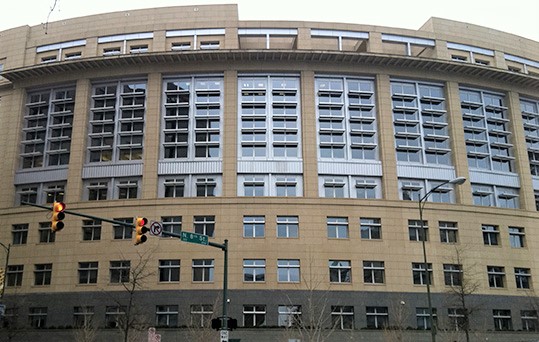Capping a two-year fall from grace, veteran Richmond attorney Bruce Matson was sentenced on Monday to 44 months in federal prison related to his theft of $4 million of bankruptcy trust funds.
The longtime bankruptcy trustee, who spent most of his nearly four-decade career at now-collapsed LeClairRyan, was immediately taken into custody by the U.S. Marshals Service.
Matson was convicted of and had pleaded guilty to obstructing an official proceeding, due to lies he told to federal officials as they were digging into how money went missing from the bankruptcy estate of Henrico-based title insurance giant LandAmerica during Matson’s time as trustee and ended up in his personal bank accounts.
The punishment was handed down by Judge John Gibney in front of dozens of onlookers, including Matson’s family, friends and fellow church congregants.
So large was the crowd of supporters who showed up for Matson that the judge ordered several additional spillover courtrooms to be opened up to help space people out and maintain social distancing. They were able to view the hearing via a video feed.
Matson, who wore a black suit, black mask and pink tie, was flanked by his defense attorneys Brandon Santos and Richard Cullen of McGuireWoods, as well as Danny Onorato from Schertler, Onorato, Mead & Sears in D.C.
The 64-year-old, who has already been disbarred, was at times tearful as the judge heard from Matson’s wife and daughter, as well as the prosecution and defense, as both sides made one final effort to sway Gibney one way or the other.
Gibney said he was moved by the dozens of letters sent to the court from Matson supporters leading up to the sentencing. They described an otherwise virtuous man who, while being a devoted husband, father, mentor and churchgoer, inexplicably and uncharacteristically went astray.
“I read those letters, which reveal a different side of Mr. Matson,” Gibney said.
But, Gibney later added, “Here’s something I’ve learned in 11 years on the bench: Everybody has two sides. I’m always astounded.”
The judge spent a considerable amount of time querying attorneys from both sides and pondering himself why Matson stole the money in the first place. Why, after apparently 40 years of a successful law career, did he pocket the money but not spend it?
The money was all accounted for when Matson’s theft was brought to light in 2019, and it apparently was not used to fund an exorbitantly lavish lifestyle. It sat untouched in his accounts.
“That’s what’s mind-boggling to me,” Gibney said. “Mr. Matson has enough assets that he could have stopped practicing law five years ago. The amount he took isn’t enough to make him afford an island in the Carribean.
“On top of all that, he was just a phenomenal bankruptcy lawyer. He could have gotten a job with any firm in town. What he did here is not rational in any sense. Why take the money for it to just sit there?”
Assistant U.S. Attorney Thomas Garnett attempted to answer Gibney’s questions.
“It was fraud for fraud’s sake,” Garnett said, adding that Matson’s scheme played out over a period from 2015 to 2019 and involved calculated steps such as setting up fake bank accounts and manipulating the final LandAmerica trust budget to make it easier for him to manipulate funds.
Gibney, in part citing a psychological evaluation of Matson that was completed leading up to sentencing, described it as a sort-of security blanket in the face of professional and personal turmoil. That included familial obligations and the drawn-out demise of LeClairRyan, where Matson was chief legal officer in its later years.
“He didn’t spend the money; he had it there, I guess, in case he needed it,” Gibney said.
Matson then addressed the court, emphasizing his regrets and his desire to serve his punishment and re-enter society as a productive citizen.
“I can’t express how deeply sorry I am for the conduct that brings us here today,” Matson said. “I’ve disappointed so many people.”
He apologized to the Virginia State Bar, to the bankruptcy court and to his family.
“I’ve lost a lot as a result of these actions,” he said.
Matson’s legal troubles largely began in August 2019, when it was brought to the bankruptcy court’s attention that LandAmerica’s $2.8 million wind-down fund had been emptied. Those funds were not to be disbursed until the wind-down period came to a close in 2021.
Matson had overseen the complex LandAmerica case from the time of the company’s collapse in 2008 until its seemingly successful conclusion in 2015.
The missing money was discovered largely due to LeClairRyan’s collapse. It was during the longtime law firm’s bankruptcy proceedings, which are still ongoing, that the same financial firm that had worked the LandAmerica case was combing through LeClairRyan’s financials and noticed a discrepancy.
Matson, while offering several excuses when initially confronted, eventually admitted that the funds were transferred to his and an associate’s accounts, before returning them. Matson was then removed as LandAmerica’s trustee, despite his objections, and then conceded to being disbarred by the Virginia State Bar in November 2020.
He was charged and pleaded guilty in July, when it was revealed that his fraud went back further than first known and carried over into another bankruptcy case on which he had served as trustee.
The U.S. Attorney’s Office and Matson’s camp negotiated a plea deal in light of him cooperating with the investigation, returning all the money, accepting responsibility and his lack of a prior criminal record.
His single count of obstruction carried a maximum sentence of five years. Prosecutors had asked for at least 47 months, while Matson and his attorneys asked for no more than 37 months.
In addition to the 44-month sentence, Matson was ordered to pay a $10,000 fine and three years of supervised release after his time in prison.
The judge said he would recommend Matson serve his time in FCI Cumberland, a federal penitentiary with a lower security camp in Allegany County, Maryland.
Matson’s also barred from being employed as a fiduciary or handling the funds of others.
Capping a two-year fall from grace, veteran Richmond attorney Bruce Matson was sentenced on Monday to 44 months in federal prison related to his theft of $4 million of bankruptcy trust funds.
The longtime bankruptcy trustee, who spent most of his nearly four-decade career at now-collapsed LeClairRyan, was immediately taken into custody by the U.S. Marshals Service.
Matson was convicted of and had pleaded guilty to obstructing an official proceeding, due to lies he told to federal officials as they were digging into how money went missing from the bankruptcy estate of Henrico-based title insurance giant LandAmerica during Matson’s time as trustee and ended up in his personal bank accounts.
The punishment was handed down by Judge John Gibney in front of dozens of onlookers, including Matson’s family, friends and fellow church congregants.
So large was the crowd of supporters who showed up for Matson that the judge ordered several additional spillover courtrooms to be opened up to help space people out and maintain social distancing. They were able to view the hearing via a video feed.
Matson, who wore a black suit, black mask and pink tie, was flanked by his defense attorneys Brandon Santos and Richard Cullen of McGuireWoods, as well as Danny Onorato from Schertler, Onorato, Mead & Sears in D.C.
The 64-year-old, who has already been disbarred, was at times tearful as the judge heard from Matson’s wife and daughter, as well as the prosecution and defense, as both sides made one final effort to sway Gibney one way or the other.
Gibney said he was moved by the dozens of letters sent to the court from Matson supporters leading up to the sentencing. They described an otherwise virtuous man who, while being a devoted husband, father, mentor and churchgoer, inexplicably and uncharacteristically went astray.
“I read those letters, which reveal a different side of Mr. Matson,” Gibney said.
But, Gibney later added, “Here’s something I’ve learned in 11 years on the bench: Everybody has two sides. I’m always astounded.”
The judge spent a considerable amount of time querying attorneys from both sides and pondering himself why Matson stole the money in the first place. Why, after apparently 40 years of a successful law career, did he pocket the money but not spend it?
The money was all accounted for when Matson’s theft was brought to light in 2019, and it apparently was not used to fund an exorbitantly lavish lifestyle. It sat untouched in his accounts.
“That’s what’s mind-boggling to me,” Gibney said. “Mr. Matson has enough assets that he could have stopped practicing law five years ago. The amount he took isn’t enough to make him afford an island in the Carribean.
“On top of all that, he was just a phenomenal bankruptcy lawyer. He could have gotten a job with any firm in town. What he did here is not rational in any sense. Why take the money for it to just sit there?”
Assistant U.S. Attorney Thomas Garnett attempted to answer Gibney’s questions.
“It was fraud for fraud’s sake,” Garnett said, adding that Matson’s scheme played out over a period from 2015 to 2019 and involved calculated steps such as setting up fake bank accounts and manipulating the final LandAmerica trust budget to make it easier for him to manipulate funds.
Gibney, in part citing a psychological evaluation of Matson that was completed leading up to sentencing, described it as a sort-of security blanket in the face of professional and personal turmoil. That included familial obligations and the drawn-out demise of LeClairRyan, where Matson was chief legal officer in its later years.
“He didn’t spend the money; he had it there, I guess, in case he needed it,” Gibney said.
Matson then addressed the court, emphasizing his regrets and his desire to serve his punishment and re-enter society as a productive citizen.
“I can’t express how deeply sorry I am for the conduct that brings us here today,” Matson said. “I’ve disappointed so many people.”
He apologized to the Virginia State Bar, to the bankruptcy court and to his family.
“I’ve lost a lot as a result of these actions,” he said.
Matson’s legal troubles largely began in August 2019, when it was brought to the bankruptcy court’s attention that LandAmerica’s $2.8 million wind-down fund had been emptied. Those funds were not to be disbursed until the wind-down period came to a close in 2021.
Matson had overseen the complex LandAmerica case from the time of the company’s collapse in 2008 until its seemingly successful conclusion in 2015.
The missing money was discovered largely due to LeClairRyan’s collapse. It was during the longtime law firm’s bankruptcy proceedings, which are still ongoing, that the same financial firm that had worked the LandAmerica case was combing through LeClairRyan’s financials and noticed a discrepancy.
Matson, while offering several excuses when initially confronted, eventually admitted that the funds were transferred to his and an associate’s accounts, before returning them. Matson was then removed as LandAmerica’s trustee, despite his objections, and then conceded to being disbarred by the Virginia State Bar in November 2020.
He was charged and pleaded guilty in July, when it was revealed that his fraud went back further than first known and carried over into another bankruptcy case on which he had served as trustee.
The U.S. Attorney’s Office and Matson’s camp negotiated a plea deal in light of him cooperating with the investigation, returning all the money, accepting responsibility and his lack of a prior criminal record.
His single count of obstruction carried a maximum sentence of five years. Prosecutors had asked for at least 47 months, while Matson and his attorneys asked for no more than 37 months.
In addition to the 44-month sentence, Matson was ordered to pay a $10,000 fine and three years of supervised release after his time in prison.
The judge said he would recommend Matson serve his time in FCI Cumberland, a federal penitentiary with a lower security camp in Allegany County, Maryland.
Matson’s also barred from being employed as a fiduciary or handling the funds of others.






At least he didn’t get the minimum. Happy Thanksgiving you rotten crook
So what about his cohort, Rob Smith? So no accountability for a million plus winding up in an account belonging to him and his wife? He’s a so called forensic accountant, so ignorance is no excuse. The irony that the firm he used to work for found the money in his account is priceless. Who would hire this guy now? “Concluding the case included the creation of a $3 million wind-down fund that was put in place for six years for incidental costs, and leftover money from that fund was not supposed to be disbursed until this year. Matson’s fall… Read more »
good point about Smith, why wasn’t he charged?
This man steals millions and gets minimal time in a cushy Federal prison.
Other people steal a 10.00 cd they get 20 years.
Crime does pay. WHITE (color) I mean COLLAR crime.